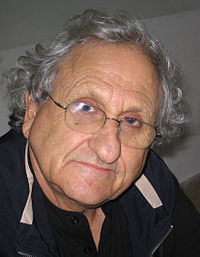A. B. Yehoshua
| A. B. Yehoshua | |
|---|---|
 |
|
| Born | Avraham B. Yehoshua December 9, 1936 Jerusalem |
| Occupation | Novelist, essayist, short story writer, playwright |
| Nationality | Israeli |
| Ethnicity | Sephardi |
| Alma mater |
Hebrew University of Jerusalem (BA, 1961) Teachers College (1962) Sorbonne (MA, French Literature) |
| Literary movement | Israeli "New Wave" |
| Notable works | Mr. Mani (1990); The Lover (1977); "Facing the Forest" |
| Notable awards | Akum Prize 1961 National Jewish Book Award 1990, 1993 Israel Prize for Literature 1995 Los Angeles Times Book Prize 2006 A Woman in Jerusalem |
| Spouse | Dr. Rivka Kirsninski (m. 1960) |
Abraham B. Yehoshua (Hebrew: א.ב. יהושע, born December 19, 1936) is an Israeli novelist, essayist, and playwright, published as A. B. Yehoshua. The New York Times called him the "Israeli Faulkner."
Avraham ("Boolie") Yehoshua was born to a fifth-generation Jerusalem family of Sephardi origin. His father, Yaakov Yehoshua, was a scholar and author specializing in the history of Jerusalem. His mother, Malka Rosilio, immigrated from Morocco in 1932. He grew up in Jerusalem's Kerem Avraham neighborhood.
Yehoshua served as a paratrooper in the Israeli army from 1954 to 1957. He attended Gymnasia Rehavia. After studying literature and philosophy at the Hebrew University of Jerusalem, he began teaching. He lived in Jerusalem's Neve Sha'anan neighborhood.
From 1963 to 1967, Yehoshua lived and taught in Paris and served as the General Secretary of the World Union of Jewish Students. Since 1972, he has taught Comparative and Hebrew Literature at the University of Haifa, where he holds the rank of Full Professor. In 1975 he was a writer-in-residence at St Cross College, Oxford. He has also been a visiting professor at Harvard (1977), the University of Chicago (1988, 1997, 2000) and Princeton (1992).
Yehoshua is married to Rivka, a clinical psychologist and psychoanalyst. They have a daughter and two sons, and six grandchildren.
From the end of his military service, Yehoshua began to publish fiction. His first book of stories, Mot Hazaken (The Death of the Old Man) was published in 1962. He became a prominent figure in the "new wave" generation of Israeli writers who differed from earlier writers in their focus on the individual and interpersonal rather than the group. Yehoshua names Franz Kafka, Shmuel Yosef Agnon, and William Faulkner as formative influences.Harold Bloom wrote an article about Yehoshua's A Late Divorce in the New York Times, and also mentions it in his The Western Canon.
...
Wikipedia
